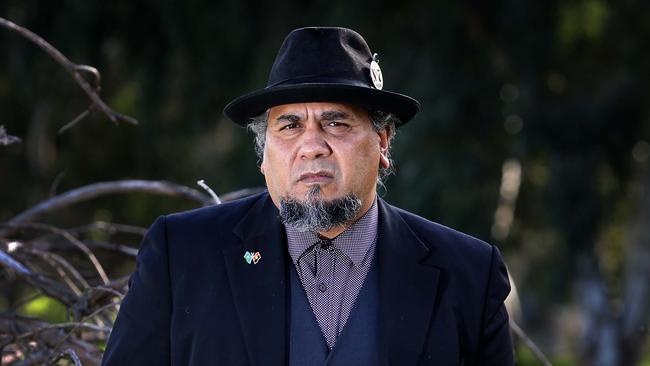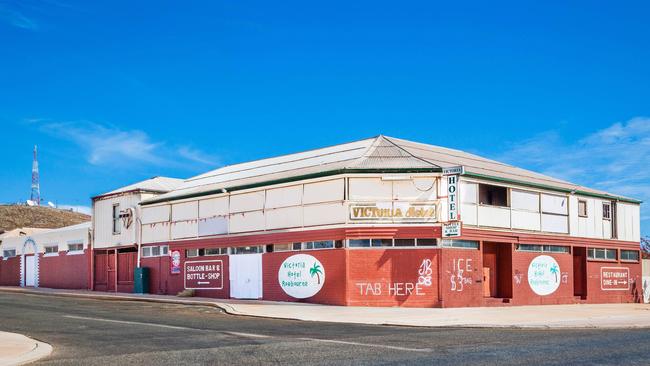Michael Woodley’s balancing act in the Pilbara
Hunting rare mice, buying pubs and negotiating with miners are all part of the job.

The job of an indigenous CEO in the Pilbara comes with some unexpected assignments. Michael Woodley, who heads the Yindjibarndi Aboriginal Corporation, recently found himself making a 150 kilometre round trip to visit the Pilbara pebble mound mouse.
To be precise, Woodley was driving four female passengers around 60 sites where the elderly indigenous women had knowledge of the tiny and threatened native mouse living there. “We left early on a Friday and we visited every single site,” Woodley recalls, with evident pleasure. “People looked at them and said, ‘Boy these elders are more active than most young fellas!’”
The mouse monitoring is part of an environmental survey undertaken by Rio Tinto, the giant mining company that has iron ore mines across Yindjibarndi land. The image of a jocular Woodley going out on country with elders for the Rio survey is a far cry from the younger man who, in 1993, was a trainee in Rio’s Aboriginal Training and Liaison division.
Woodley became one of ATAL’s star recruits and was featured in Rio’s promotional literature. But he eventually felt the stronger pull of obligation to his own people, a twin desire to preserve thousands of years of Yindjibarndi culture and provide an economic future.
Many of Woodley’s relatives – and those of his wife, Lorraine Coppin – were first contact people; they struggled to gain skills or set up businesses in the slipstream of the Pilbara’s iron ore province, the biggest and most prosperous of its kind in the world.
Woodley, now 47, is one of Australia’s longest-serving indigenous CEOs in a field more often inhabited by “whitefella” CEOs running Aboriginal corporations. In 2007, in only his mid-30s, he was appointed CEO of YAC, the corporation established after the Federal Native Title Court recognised the traditional land rights of Yindjibarndi people.
His contract has been renewed numerous times by YAC’s board of 12 directors, all of them Yindjibarndi. He insists on three-year contracts. “I’ve said: ‘Anytime you’re losing confidence in me you can pull the trigger.’” He’s proud of the all-Aboriginal board. “It’s a good model because if we make a bad decision, we’ve got nobody to blame but ourselves,” he says. “We can’t blame a whitefella.”
The corporation’s job is to manage native title issues. A separate board handles the trust fund into which mining royalties are delivered. “We became a driving force for what we could do with the funds,” says Woodley, who was born in Yindjibarndi country in 1972. “We were guided by three principles: community, culture and commerce. That whole 3Cs model energises me. I can’t wait till Mondays because I don’t see this as just a job.”
The thrust of YAC and its offshoot businesses is to create a diverse range of economic activity for Woodley’s people, who live in and around the largely indigenous Pilbara town of Roebourne.
Almost every Pilbara resident in towns such as Karratha and Newman is directly reliant on multi-national resource companies. YAC was always destined to rely indirectly on mining on its lands. “But we need a self-sustaining indigenous economy in the Pilbara,” Woodley says firmly. “That’s been a driver of mine from the start, no ifs or buts.”
In 2013, YAC set up a business arm called Yurra, which is 66 per cent owned by Yindjibarndi people and runs a portfolio of business ventures, including ground and maintenance crews for mining companies. “All of the people who want to do something on country need to first come through YAC’s door. Then we say our preferred business arm is Yurra.”
Yurra has contracts worth $70 million and provides jobs for 103 people, half of them indigenous workers – “not a bad record for a company that started in 2013 with only two employees”. There are long-term contracts with bigger subcontracting firms that provide catering and cleaning services. Yurra also co-ordinates heritage work carried out by elders “where a mining company wants to do something on our country”.

The latest Yindjibarndi-led venture centres on Roebourne’s once notorious Victoria Hotel. The region’s first pub, which dates to the late 1890s, closed in 2005 due to social problems sparked by heavy alcohol consumption in the town.
Woodley, who doesn’t drink or smoke, oversaw YAC’s purchase of the hotel in 2013 and a community decision was made not to renew its liquor licence. Then began a restoration project using $2 million each from the Yindjibarndi Capital Trust and the West Australian and federal governments.
Structural work was officially finished on time and within budget last month, having created 10,000 hours of indigenous employment. The hotel will formally reopen its doors in September as the town’s business and cultural centre. “We’ll be leasing up to 10 office spaces to NGOs, government services and industry,” he says. “Downstairs will have a cafe and the local library is also moving in.”
Pilbara Development Commission CEO Terry Hill says the commission has worked with Woodley and YAC on several projects. Victoria Hotel’s rebirth “has been especially exciting,” Hill says. “It’s a project for the Roebourne community, by the Roebourne community. They have implemented a number of innovative approaches in delivering the project, including working with the Roebourne regional prison to have inmates work on the building and gain skills.
“They exceeded their goal for Aboriginal employment hours on the project by something like five times the original target. They also engaged students from Roebourne High School, with construction-based school learning as an activity. It shows a lot of vision and drive, and while Michael wouldn’t have been alone in having that, his ability to bring partners and community to work together has to be credited for part of that success.”
Inside the hotel’s proposed cultural centre, five sophisticated digital booths will display photos, videos and materials from 60,000 years of continuous living culture for tourists and locals.
The material comes from another Yindjibarndi initiative, the Juluwarlu cultural archive. Now considered one of the nation’s finest private Aboriginal archives, it began in 1998 when Coppin suggested to Woodley that he record his grandfather’s stories for later generations. Before long, the couple had attracted a small dedicated army of film makers, archivists, artists and anthropologists to help them expertly record all aspects of Yindjibarndi’s living and ancestral culture.
Operating out of a house in Roebourne’s suburbs, Juluwarlu is a thriving business that includes digital media, radio broadcasting, media training and a publishing operation that has produced award-winning books on Yindjibarndi culture. “It took enormous dedication and time,” says Woodley.
Woodley’s day job as CEO is matched by added responsibilities as custodian of certain traditional songs and dances. He says it fell to his generation “to pick up the pieces and to straddle cultural breaks that opened with the deaths of (my) grandfathers and grandmothers in the 1990s”.
His dual role as a local indigenous leader adds a layer of tension not faced by many white executive leaders. In 2011, an acrimonious split emerged within his own Yindjibarndi ranks when Woodley rejected a royalty offer by mining magnate Andrew Forrest and Fortescue Metals Group for its multibillion-dollar Solomon Hub iron ore project, located on Yindjibarndi country.
Woodley argued that Fortescue was offering far less than the industry standards set by Rio Tinto and BHP. A small breakaway group of traditional owners attacked Woodley for failing to accept the company’s offer of a jobs and housing package in lieu of royalty payments above $4 million a year. It was a bruising fight, with Woodley’s leadership called into question in court and among breakaway members, some of them his relatives.
A landmark Federal Court ruling in July 2017 found in the majority Yindjibarndi group’s favour; giving them exclusive native title rights over the Solomon mine area, opening the way for a potentially large compensation claim against Fortescue. The miner, whose appeal against the ruling is pending, says it has delivered more than $85 million in native title royalties. “Fortescue is committed to providing a hand up, not a hand out for Aboriginal communities through a focus on provision of training for real jobs and economic opportunities that break the welfare cycle,” CEO Elizabeth Gaines tells The Deal.
Woodley says he doesn’t dwell on the legal skirmishes. “I’m most proud of the journey we’ve all been on, providing information and then letting people tell us where they want to go,” says the man who drove 150km on the orders of his elders, the Pilbara pebble mound mouse custodians. “When you’ve got everyone informed, they can decide if it’s right or wrong.”



To join the conversation, please log in. Don't have an account? Register
Join the conversation, you are commenting as Logout